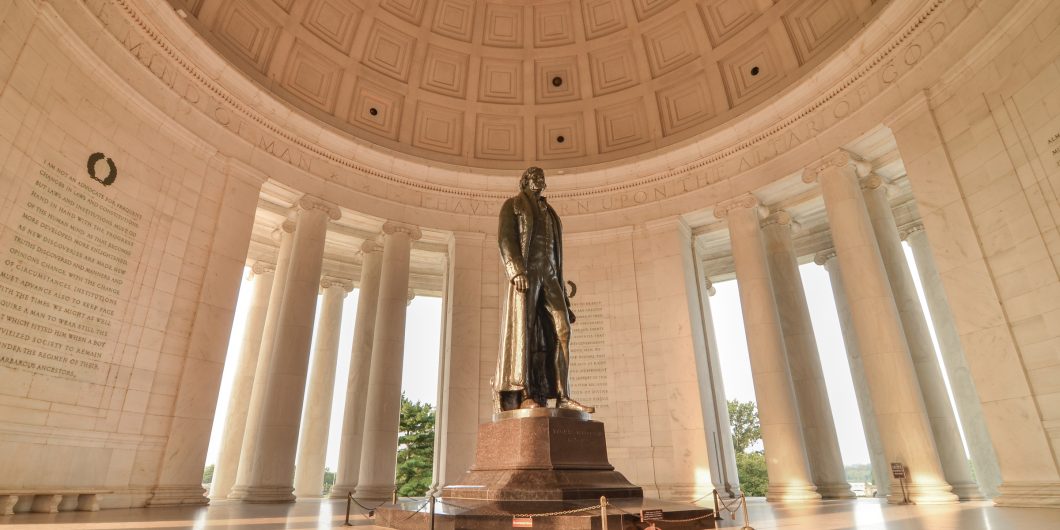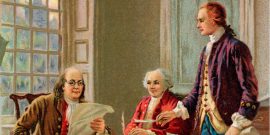To preserve both the country and political philosophy, Jaffa returned to the beginning.
Wrestling With the Founding in the Culture Wars
As America prepares to celebrate her 250th anniversary in less than three years, it is perhaps strange that the Founders are still alive in our national consciousness and indeed play an outsized role in it. Two and a half centuries on, most countries have forgotten their founders. Yet in America, national debates about every topic return, almost without fail, to some reference to our Founders and their intents.
Some of this is healthy civic reverence, but a lot of it is something else. The Founders serve as proxies, as sock puppets, for conflicts that are more about our unhappiness with each other and the current state of our country, than about any disinterested study of the past for its own sake. For evidence of this, we need look no further than the 1619 Project, and its competitor, the 1776 Project, both of which are political projects and distorted by that fact.
The study of American political thought has become yet another venue for the endless culture war that characterizes our public discourse. So many of our debates are dominated by either those who think the Founders are the fundamental source of our woes—the negators—or those who think there’s nothing wrong with the country that more Founders couldn’t solve—the affirmers. These two perspectives line up in a fairly straightforward way with the familiar sides of our culture war, thus making the past look more and more like just another version of ourselves.
Of course, the truth is that the past really is a foreign country. They do things differently there. One benefit of studying the past, any past, is that we can learn just how different it was, and therefore maybe get some perspective on our own time. We can, for a time, get out of our own heads, think about someone else’s problems, and possibly gain some wisdom about our own.
Thomas Jefferson, Our Politically Unclassifiable Founder
Let us try to get us out of our heads a little bit by talking about a figure we talk about a lot, perhaps too much: Thomas Jefferson. Thomas Jefferson was weirder and more complex than our political discourse today can easily acknowledge. Consider these two facts. On the one hand, Jefferson was, as we might say today, French Revolution adjacent. He was sympathetic to the revolution for a long time, perhaps longer than we today feel comfortable with. In a well-known letter to William Short in 1793, Jefferson praised, or at least accepted, the violence of the revolution as necessary for the cause of human freedom. On the other hand, at the end of his life, Jefferson was Southern secessionist adjacent. The whole point of the famous letter to John Holmes of 1820, sometimes called the “wolf by the ear” letter, is that if Congress tried to regulate slavery in the territories, the Southern states would break the Union. Contrary to Abraham Lincoln’s later appeals to a “founding consensus” on slavery in the territories, carefully crafted for his political audiences, Jefferson thought and argued that slavery should in fact spread throughout the territories.
This Jefferson makes us feel uncomfortable. How can you describe a figure who wrote the Declaration of Independence, sympathized with the radical parts of the French Revolution, and yet still ended up in a place close to what the proslavery South became? We don’t have a name for this. Jefferson continues to frustrate our desire for clear political categories.
What are we to make of this? Perhaps this observation might help. For most of us, the first word that comes to mind when we hear the name Jefferson is “hypocrite.” And of course, it is hard to argue with that, for all the reasons that we already know. The man wrote the Declaration, but owned slaves; he orchestrated the Louisiana Purchase against his narrow interpretation of executive power; the list goes on. At the same time, the word hypocrite doesn’t really do justice to the Jefferson phenomenon. For one thing, hypocrite leads us to think about the situation largely in terms of personal moral behavior, as though it were simply a matter of someone preaching one thing in public but acting differently in private. Now, there is a dimension of Jefferson’s actions that fits this—think of Sally Hemings.
But there’s another word that fits Jefferson better. That word is tragedy or grand self-contradiction. In tragedy, precisely at the moment when he becomes himself most fully, the hero also undermines everything he holds highest. Today we aren’t used to thinking in terms of tragedy. When we discover a flaw in a well-known figure we rush to turn it into a point against the other side and a point in favor of our own self-righteousness—a style of argument all too familiar from the internet but not only there. But what if Jefferson was the unself-aware author of his own undoing? Our own tendency to melodrama makes it difficult for us to see Jefferson in his complexity. Nonetheless, we are still living with the consequences, not merely of the hypocrisy, but even more of the grand self-contradiction of Jefferson and the founding generation even today.
The study of American political thought and the Founders is neither the source of all our woes nor can it be their remedy. Only we, the living, can do that.
Understanding the Essence of the Founding
Thomas Jefferson, through his politically unclassifiable life, in all his glory and folly, shows us what both the negaters and the affirmers of the Founding and the Founders get wrong. The negaters are blind to the fact that there is something noble and great in the American founding. We aren’t wrong to continue to live with the Founders in our heads and our national consciousness. The affirmers, on the other hand, go wrong because they think that the legacy of the Founders is a political cause that has to be endorsed or attacked today. But a legacy or an inheritance isn’t a political cause like that. It’s a fact, a given, about us and our political community. It is there whether we like it or not, and it continues to shape us both positively or negatively, whether we want it to or not. It’s not a political platform but a problem, a predicament, and it needs to be understood and investigated before being affirmed or negated.
There is an even deeper problem here, which confounds any simple affirmation or negation of the American founding. This is the fact that the core of our tradition is, paradoxically, the critique of tradition, that is, a spirit of critique. American conservatives seek to conserve a revolution and even the idea of revolution. Conversely, the American progressives can only make progress by re-enacting and so remembering or conserving the revolution that created the country. Progressives need the memory of the revolution as much as conservatives need the memory of the revolution. Leo Strauss used to joke that the most conservative group in the United States was called the Daughters of the American Revolution. On the other side, activist groups in every generation have offered thunderous moral critiques of the status quo in the name of the rights of the oppressed, thus re-enacting the Jeffersonian story, often against Jefferson’s accomplishments. From one angle, that’s America: always rebelling, never quite successfully founding.
This is why the polarization of American universities is so dangerous. It was precisely their task to provide spaces to stand outside of the ever-present temptation to turn the past into the present. Today, then, our universities have no more pressing task than to create the institutional conditions for the non-institutionalized activity of critique towards which the Founding calls us. Our universities must create and steward spaces for the life of the mind. In this way, we try to keep something alive that is all too easily overwhelmed by political passions, the necessities of life, and the imperative to make a living.
Founders Against Founder Worship
In a letter to Samuel Kercheval in 1816, Jefferson proposed that a healthy country should have a constitutional convention every 19 or 20 years, as every new generation of citizens reached maturity. Now, there are many practical objections to this scheme. For anyone who has worked in a complex organization with many competing points of view, the thought of putting all the rules up for discussion at a single time, and on a regular basis, will induce sea sickness.
Yet there is a deeper truth in Jefferson’s suggestion. What is he trying to say with this suggestion? Only this: we in the later generations are not subordinate or inferior to the Founders. We are not, for Jefferson, mere inheritors, grateful recipients of the excellence of others. Perhaps we are more misguided, or less thoughtful, than the Founding generation, and yet, we are still the moral and political equals to those who came before us. Jefferson is simply restating the basic claim of the Declaration of Independence: even as we vary in ability and background, all human beings are created equal.
The study of American political thought teaches us many things we need to know. It acquaints us with the landmarks we need to navigate our common life, and it can provide a deep moral, spiritual, and political formation. But it also teaches us that the founding cannot provide us with a recipe or a key to solve the problems of today. It is neither the source of all our woes nor can it be their remedy. Only we, the living, can do that. Whether we have it in us to actualize that potential remains to be seen.
A version of this essay was originally delivered as remarks at the American Council of Trustees and Alumni’s 2023 ATHENA Conference.



